Why THE CLINIC SKIN111?
Prices start at AED 4900 (after discount).
Same day implants available.
We use computer-guided dental implants for precise placement, quicker recovery, and predictable results, with a 99% success rate.
First dental care provider in DIFC - Est. 2009.
Specialize in cosmetic dentistry: Veneers, Implants, Invisalign, and Philips teeth whitening.
Free doctor consultation. Highly experienced Doctors with over 40 combined years of experience.
Procedures and consultations by highly experienced implantologists
Free 3D visualization using CBCT Scans for bone assessment.
Luxury clinic located in the heart of DIFC, features the latest technology.
Open daily from 9 AM to 10 PM
4700+ Google reviews across 3 Clinics and homecare. with 4.9 rating.
Free valet parking
40% discount with SKIN111 loyalty card.
0% interest payment plans available.
What are dental implants?
Dental implants are established solutions for missing teeth. Acting as a substitute for tooth roots, they provide a stable foundation for replacement teeth, whether fixed crowns, bridges, or dentures. Made from biocompatible materials, these dental implants integrate with the jawbone, offering a natural and durable solution.
Who needs dental implants?
Dental implants are suitable for individuals with one or more missing teeth, those looking to replace old bridges or dentures, or anyone who wants a natural-looking and permanent solution for teeth restoration should consider dental implants. With the increasing demand for teeth implants in Dubai, more residents and tourists are opting for this durable solution.
Benefits of dental implants
Dental implants offer various benefits including:
-
Natural look and feel: Dental implants resemble and function like natural teeth.
Enhanced oral health: They prevent bone loss and protect adjacent teeth.
Durability: With proper care, dental implants can last a lifetime.
Dental implant aftercare
Home care after implant surgery
Please follow the guidelines below. Call your doctor if you notice any unusual symptoms. Please remember that you are under the influence of medication post-surgery if your procedure was completed with IV sedation; therefore, do not drive, drink alcoholic beverages, sign legal documents, or make any major decisions during the next 24 hours.
- Protection of the blood clot and surgical site(s)
- Bleeding after implant placement is normal and may last for several hours.
- Put gentle pressure on your cheeks, jaws, and chin with cool packs.
- If you have a removable denture, then place gauze in the molar region and bite down.
- If there is no active bleeding, then leave the gauze out.
- Lay in a semi-reclined position. Keep your head above your heart unless you feel faint.
- Avoid spitting, bending over, sucking through a straw, and rinsing for 24 hours.
- No strenuous physical activity or smoking for 10 days.
- Oral mouth rinse should be continued for 2 weeks if prescribed.
Rinsing
Rinsing may dislodge the blood clot and interrupt the normal process of healing. Carefully follow these steps in order.
Day 1 (Day of surgery/first 24 hours after surgery):
- Do not rinse or brush your teeth.
- Do not spit.
Days 2 and 3:
- Brush your teeth 2 times a day. Be gentle around the surgical sites.
- If you have a non-fixed denture, remove it to rinse and clean the inside of the denture.
- Begin gentle rinsing using a glass of warm salt water solution (½ teaspoon of salt per 1 cup of water). Repeat rinsing after meals.
- If you were prescribed a solution, rinse as directed.
- Do not brush the gums. Avoid brushing the surgical site.
Day 4 until day 42 (6 weeks):
- Same regimen as days 2 and 3, however, rinse with a little more force.
- Continue rinsing and cleaning in this manner for 6 weeks.
- Care of teeth
- Starting day 2, brush your teeth 2 to 3 times a day. Be careful of the incisions.
- No temporary prosthesis may be placed on the implant site for at least 3 weeks unless advised otherwise.
- Do not start a Waterpik®? until 12 weeks after the surgery
Critical care and maintenance of your dental implants and restorations
An implant is a FOREIGN BODY and NOT A REAL TOOTH. IT IS A MEDICAL DEVICE. Implants and their restoration are tooth replacement systems that require continuous and stringent maintenance and care to ensure long-term success and survivability. The soft tissue around the implant/crown/prosthetics must be exceptionally maintained. The soft tissue is the “gatekeeper” which prevents food and bacteria from penetrating and/or compromising the implant in the bone. Good quality soft tissue helps to prevent chronic infections and problems with your implant prosthetics. Dental implants are an investment in yourself, your health, and your future.
Daily maintenance
Poor oral hygiene and bad oral habits (e.g., tobacco products, grinding teeth) can lead to implant and prosthetic failure. Good oral hygiene is a must. A good rotary toothbrush, such as an Oral B®? Professional Care battery-operated toothbrush, is required to maintain ideal soft tissue and excellent oral dental hygiene. Flossing around the implant restoration with the TePe®? Bridge & Implant Floss must be completed daily. After brushing and flossing use Waterpik®? Water Flosser with Interdental Brush Heads (use 50% Listerine®? mixed with 50% water in the storage tank) to flush out the areas around and between all teeth and restorations. This complete process of brushing, flossing, and flushing should be completed at least twice a day, every morning and night, to ensure no plaque accumulation, bacteria, or calculus build-up occurs around the implant or restoration. Don’t use a setting higher than #6 on the Waterpik Water flosser. For Waterpik settings, start at setting 1 pulsating. Increase by 1 level per week until level 6. In addition, it would be beneficial to complete a thorough swishing with a non-alcohol rinse (e.g., Listerine Zero) every night before bed. This will reduce bacteria and keep the area clean. A Monoject™? syringe given to you can also be used to flush the area around the implant on a daily basis if you don’t have a Waterpik Water Flosser available. In areas where you have good access and larger spaces, one could use the WaterPik Power Flosser to assist with the removal of gross plaque accumulation.
Weekly maintenance
It is critical to continue to change the bacteria content and environment around the implant prosthetic system or tooth, as the anatomy is not similar to a real tooth. The mucosa (soft tissue) around the implant on both the tongue and cheek sides must be massaged once a week with your two fingers. This will create a pressure flushing movement and will assist in changing bacteria content around the implant and reducing chronic bacteria accumulation in the area of teeth implant and soft tissue.
Yearly maintenance
Implant systems need regular dental care and maintenance by your restorative dentist. This includes cleaning of the area, radiographic evaluation, and sometimes tightening or changing parts of the implant system. The implant restoration is a screw-in-screw system which requires yearly maintenance. It is extremely important that you return to your restorative dentist as soon as possible if the crown/prosthesis becomes loose. In addition, implants do not move, but teeth do. Your bite must be assessed at every recall appointment with your restorative dentist, as overloading the implant (biting too hard on the implant) can lead to implant or restorative failure.
Please follow the guidelines as instructed. Call your doctor if you notice any unusual symptoms. Please remember that you are under the influence of medication post-surgery; therefore, do not drive, drink alcoholic beverages, sign legal documents, or make any major decisions during the next 24 hours.
Dental implants before and after
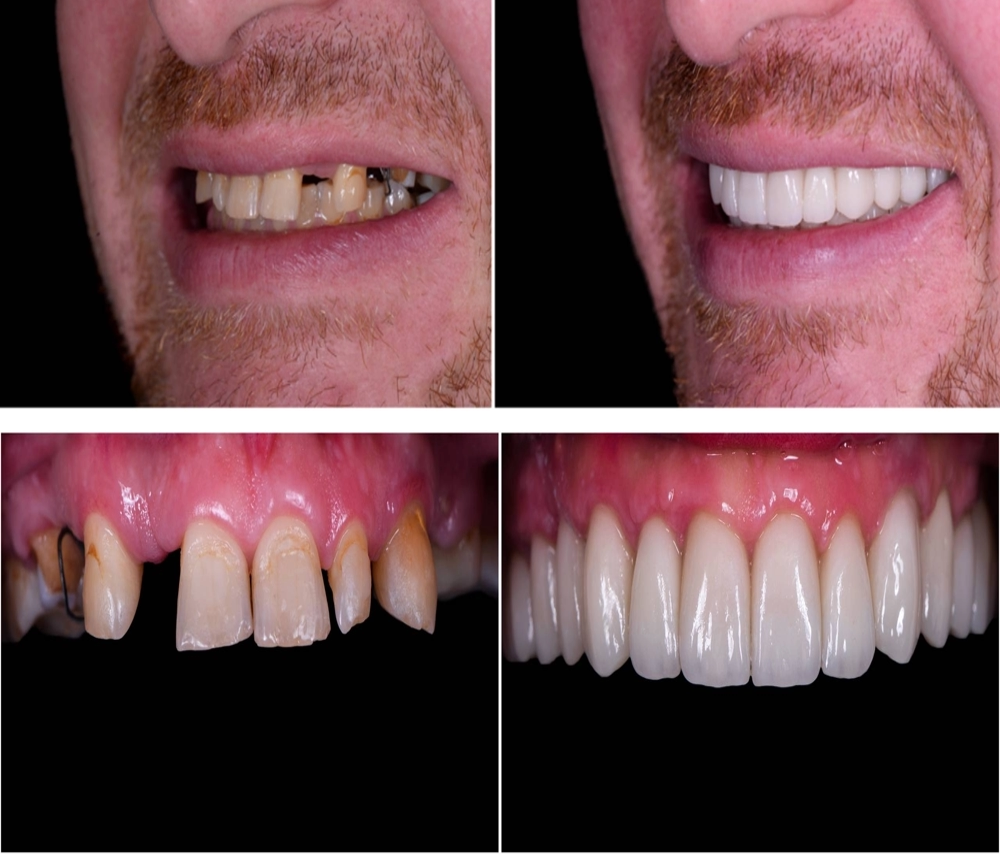
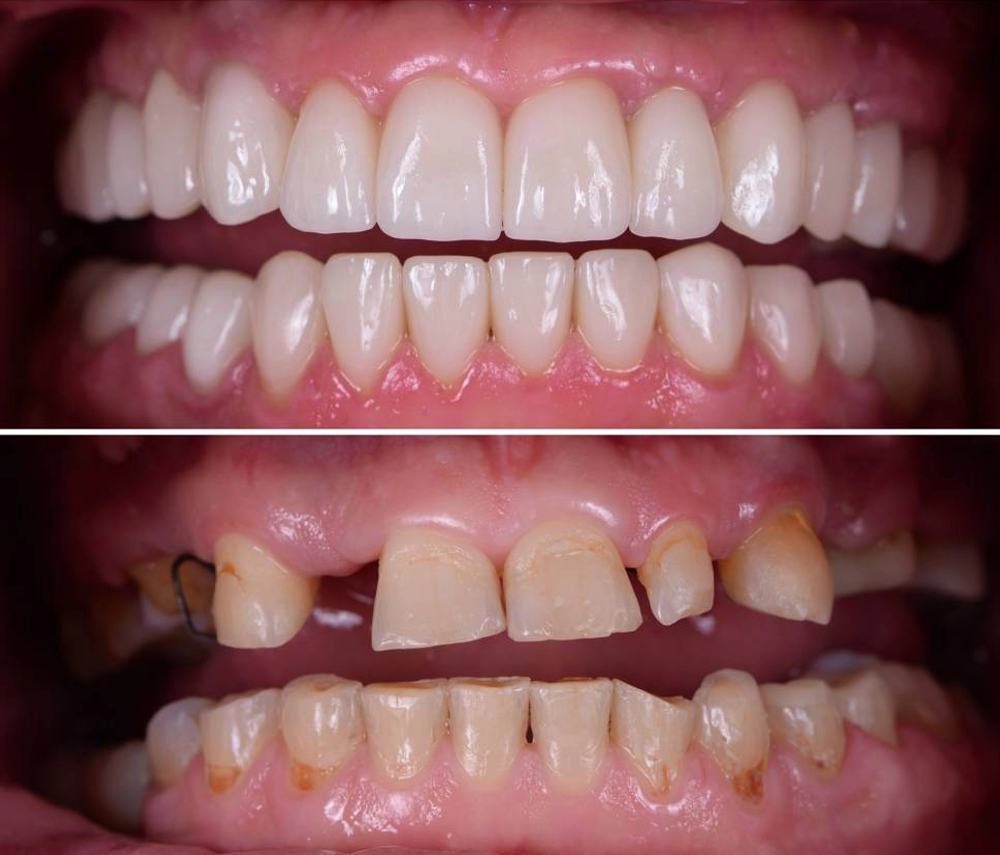
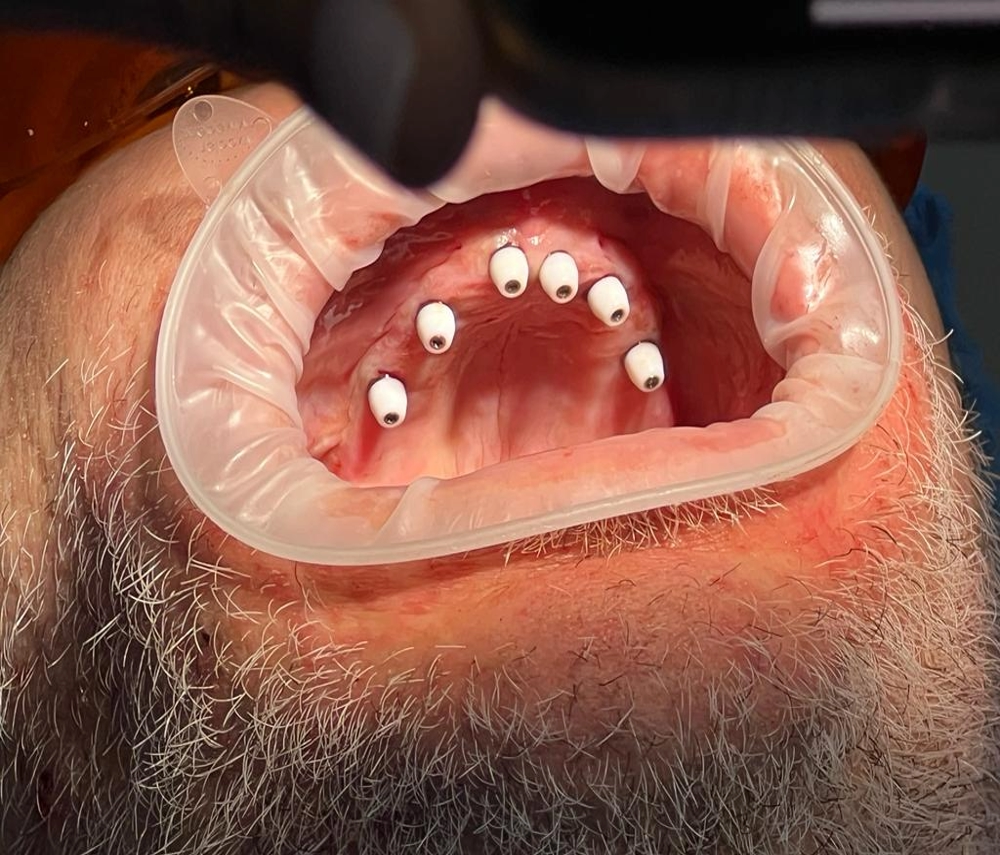
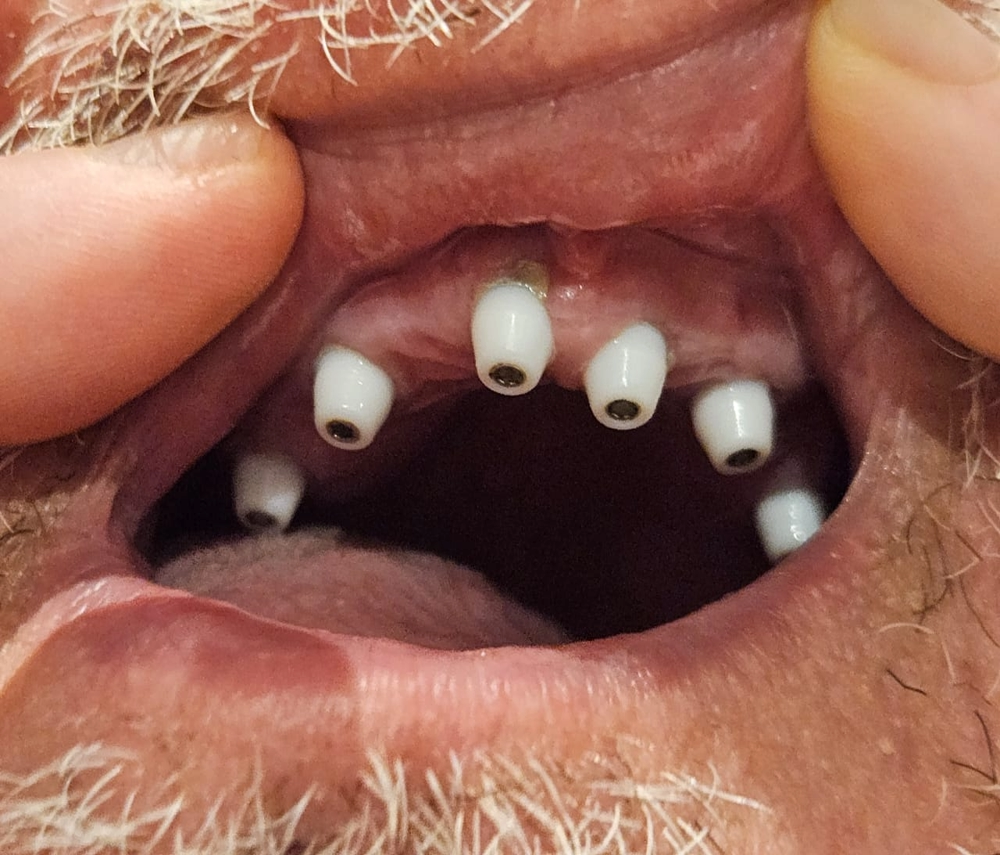
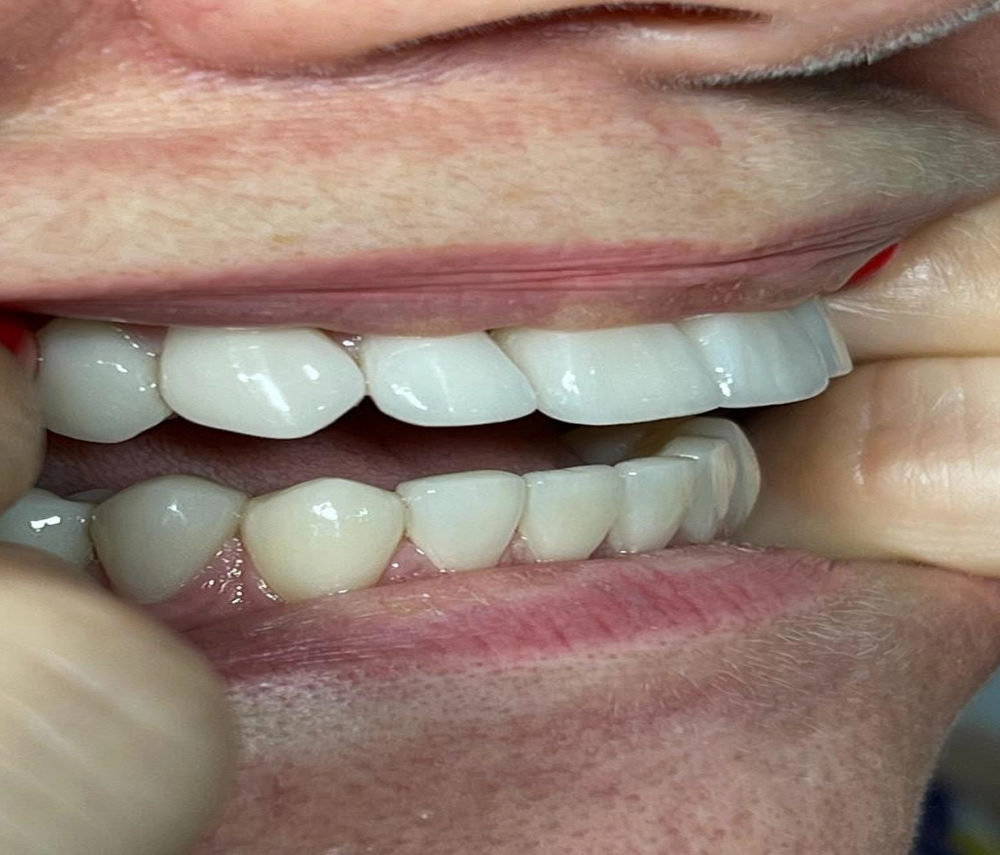
Procedure for getting dental implants in Dubai
-
Consultation: An initial meeting where a thorough
examination is conducted to understand the patient's dental condition and discuss the best teeth implant
options.
Treatment Plan: Crafting a tailored plan
addressing the number, type, and position of implants required.
Dental Implant Placement: Surgically positioning
the dental implant into the jawbone.
Healing Period: Allowing time for the jawbone to
grow around the dental implant, anchoring it securely.
Abutment Placement: Fixing the connector post to
the dental implant on which the new tooth will be placed.
Crown/Bridge/Denture Implants: Custom-made teeth
are then affixed to the abutment, restoring aesthetics and function.
Follow-up: Regular checks to ensure the dental
implants integrate well and are functioning optimally.
Maintenance of dental implants
Taking care of dental implants is much like caring for natural teeth. Regular brushing, flossing, and dental check-ups will ensure they remain in optimal condition.
Same day dental implants in Dubai
For those seeking immediate results, same day dental implants in Dubai offer a quick and efficient teeth restoration solution. Within hours, patients can walk out with a rejuvenated smile.
Implantologists / dental implant specialist in Dubai, UAE
Dubai is advanced in the practice of dentistry and implants, With advanced training and a patient-centred approach, Our implantologists ensure the best dental implants Dubai offers.
Dental implants FAQs:
How long do dental implants last?
When properly maintained, dental implants can last a lifetime. Their longevity depends on factors like oral hygiene, regular dental visits, and avoiding detrimental habits like smoking.
Are dental implants safe?
Absolutely. Dental implants are a tried and tested solution with a high success rate. However, like any surgical procedure, there are associated risks. Choosing a reputable dental implants specialist in Dubai ensures safety and success.
What is the recovery time after getting dental implants?
Recovery time after getting dental implants varies among individuals, but most experience minimal disruption. Mild discomfort can last a few days, but with advancements in same day dental implants, many patients find the process and recovery swift and straightforward
What materials are used for dental implants at Skin111?
Titanium is one of the most common materials used in dental implants. This is because it can be easily implanted into bone. Results suggest that implants made of titanium metal allow the bone to expand correctly during this period. The bone can grow next to them as it is put in contact with the bone and is not disturbed. In exchange, this would create a lasting affinity.
How does Skin111 ensure the quality and safety of their dental implant procedures?
Preventing dental implant failure begins with selecting a skilled and experienced dentist specializing in implant dentistry. Proper treatment planning, precise implant positioning, and the use of high-quality materials and guided surgery are essential to ensure successful outcomes.
What is the success rate of dental implants performed at Skin111?
Success rates of dental implants vary, depending on your overall health and habits. But, for people with good health and oral hygiene habits, implants are successful 90%-95% of the time.
Is the dental implant procedure painful?
Dental implants are considered to be the best options to replace missing or damaged teeth. The procedure itself is not painful since it is performed with either general or local anesthesia to completely numb the mouth. After dental implantation, once the numbness wears off, mild pain may be noticed by the patient.
Which teeth implants are best?
Titanium dental implants are the most common type of dental currently used. They have a long track history of success. Currently, they are the most versatile solution for restoring teeth as well. Their metal substructures and components allow for restoration of many challenging cases.
Do denture / Teeth implants look natural?
By getting an implant, you can help retain your facial structure. This coupled with a crown made from porcelain or ceramic can provide you with a dental implant. Specialist can match the crown to the shade of your original teeth in your mouth. Your dentist will likely hold cards with various hues next to your natural teeth to see which most closely fits.
Can denture implants improve my chewing ability?
Unlike traditional dentures, implant supported dentures are anchored in place by dental implants, which makes them a strong tooth replacement option. Because the implants keep the denture piece in place, patients are able to eat much more naturally, thus improving overall chewing function.
Our Doctors
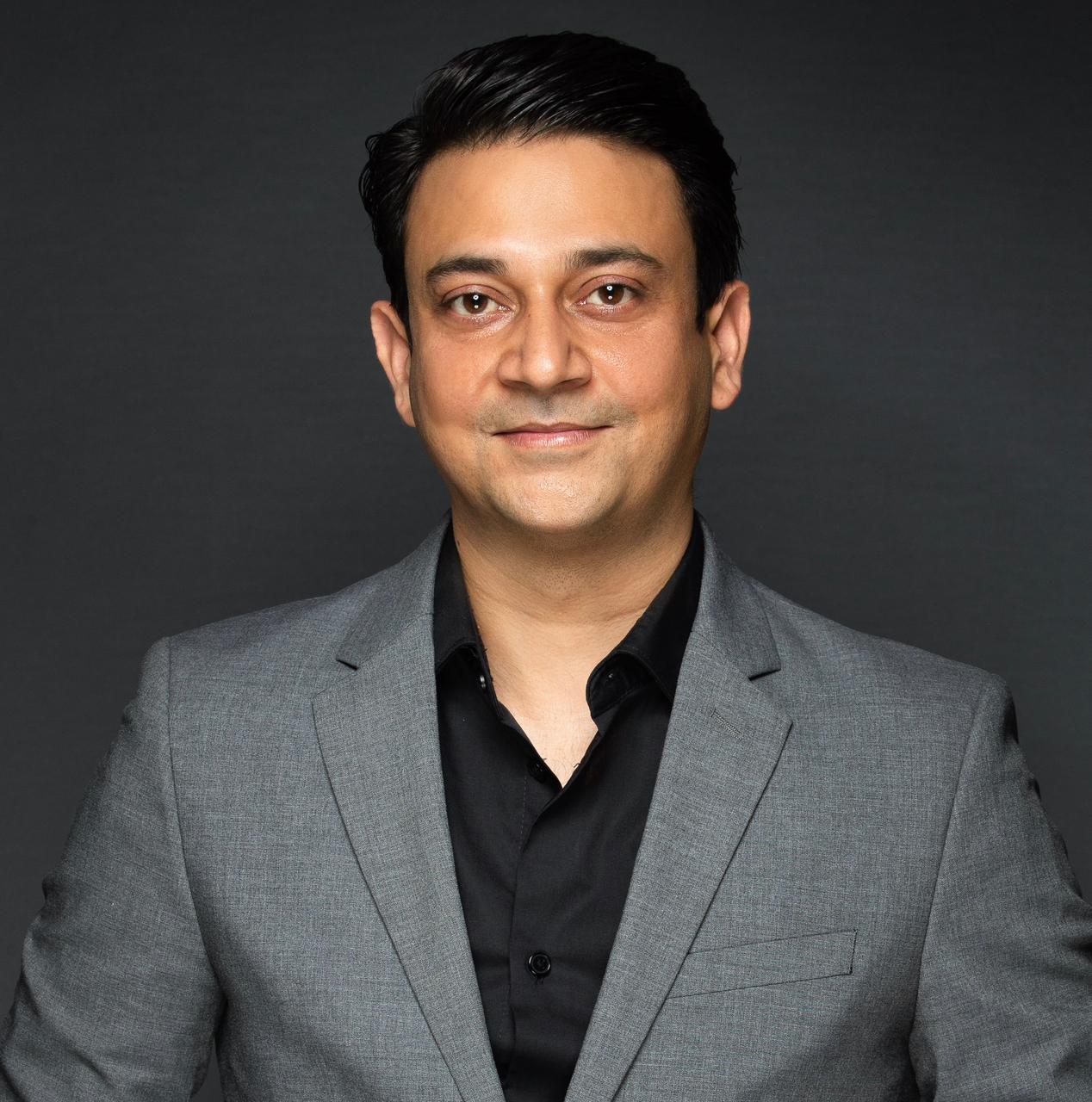
Dr. Nagender Chauhan
Specialist Prosthodontist, Cosmetic Dentist and Implantologist
Dr. Nagender Chauhan
Dr. Nagender is a highly experienced Prothodontist with nearly 2 decades of experience. He specialises in fixed and maxillofacial Prosthodontics, oral implantology, and advanced aesthetics dentistry, with affiliations including the Royal College of Surgeons, Edinburgh. He excels in facial aesthetics, smile designing, and the application of minimal or no prep veneers with precision.
View More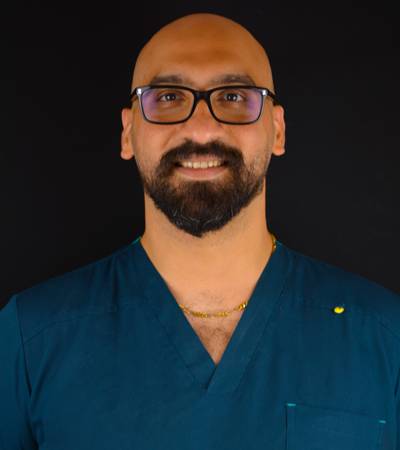
Dr. Rodi Dirki
Cosmetic Dentist & Implantologist
Dr. Rodi Dirki
Meet Dr. Rodi Dirki, a skilled dental practitioner with over a decade of experience in creating dental masterpieces. Dr. Dirki is a highly regarded dentist and the smile architect behind countless radiant smiles that have brought joy and confidence to his patients.
View More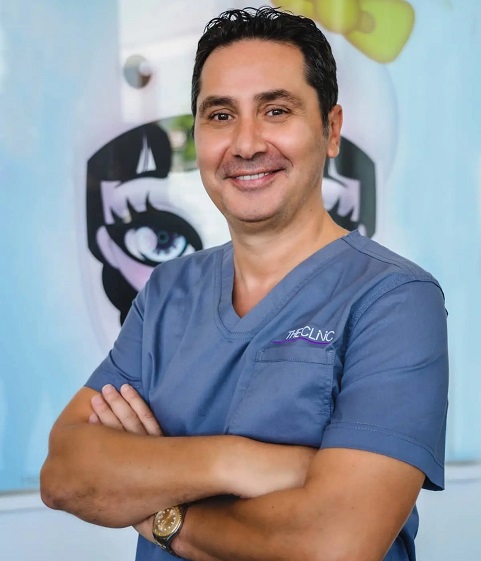
Dr. Nizar Ishaq
Specialist Orthodontist / Apex Diamond invisalign provider
Dr. Nizar Ishaq
Dr Nizar received his qualification from the University of Nantes in France and holds two Masters degrees in Orthodontics (DUO, CES). He is also a member of the French Orthodontist Association and the UAE Orthodontist Association.
View More